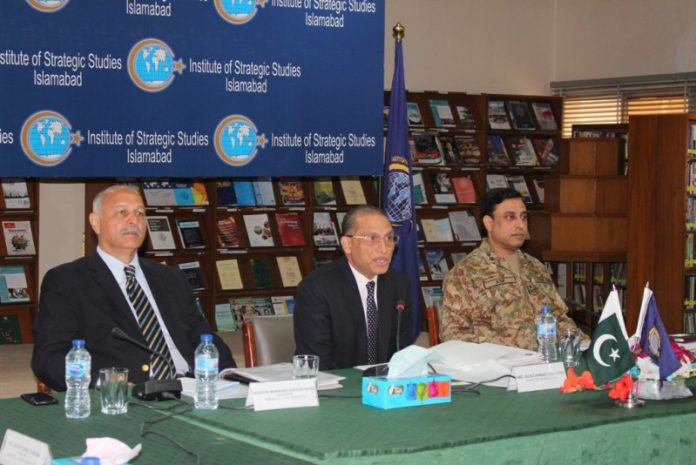Press Release
Round-table Discussion
with
Honourable Dr. Hadi Soleimanpour, Secretary General, Economic Cooperation Organization (ECO)
March 14, 2019
“The ECO vision 2025 is the major achievement of the Islamabad Summit. I am confident that Pakistan can play a traditional and leading significant role, and along with other member states, can help the ECO achieve accelerated progress and help it achieve its goals and objectives.” This was stated by Honourable Dr. Hadi Soleimanpour, Secretary General, Economic Cooperation Organization (ECO) during a Round-table Discussion at the Institute of Strategic Studies Islamabad (ISSI) today. The agenda for the session was based on how successfully the ECO has achieved its objectives of regional connectivity and trade promotion. Participants at the round-table included ambassadors, journalists and policy makers.
Dr. Soleimanpour talked about how the ECO remains the only regional organization that is multi-connected with over 55000 km of railways and 800,000 km of road networks. The organization is marked as having huge potential with a global trade of $960 billion and a regional trade of $171 billion. Hence, the need to explore this potential is huge. However, the reality is that none of the ECO members base their relations with each other on geo strategy – an approach which is based on economic cooperation and integration. The main ECO trade agreement – the Economic Cooperation Organization Trade Agreement (ECOTA) has not been implemented even after fifteen years. Despite road and rail development at national level, the member states are not properly linked at regional level. Connectivity between member states is the major issue and remains top priority of the ECO Secretariat. Sideways, there is a need to design these connectivities in a way that are commercially justifiable.
Dr. Soleimanpour stated that another issue is the Transit Transport Framework Agreement (TTFA) which has been ratified by only nine members. This agreement needs to be in place and properly implemented. With regard to the energy sector, he said that the ECO is in the process of establishing joint ventures with some of the EU countries, Chinese banks and Asian financial institutions. Work on clean energy projects is also underway. A project oriented approach is hence important. Most projects need to be supported under well-established financial system. Dr. Soleimanpour said that both the ECOTA and TTFA should be implemented in letter and spirit. He said that a balanced approach is necessary to understand the constraints of each member state and find solutions in a mutually acceptable manner.
Earlier, in his welcome remarks, Director General ISSI, Ambassador Aizaz Ahmad Chaudhry highlighted how globalization is spurring many responses one of which is regionalism. He said that in order to lead the process of regional development, economic organizations can play the role of a catalyst and locomotive. For several decades, the South Asian region has been unsuccessfully attempting integration. In this regard, it is necessary to take stock of what has been achieved so far in tangible terms. Pakistan stands at the crossroads of regional connectivity, and it is imperative to link together the landlocked member states of the ECO he said. By creating linkages, both Gwadar and Chabahar ports can facilitate maritime trade. The ECO Vision 2025 has set targets for member states to cope with challenges unfolding in the current world landscape. The indisputable reality is that the potential of ECO cannot be fully utilised unless member states work together in the domain of economic cooperation.
Some points raised during the discussion were that the ECO should focus on other areas such as education as well. In this regard, it was suggested that ECO scholarships should be introduced. A gap identified was the lack of people-to-people contact in all spheres. There is also a need to establish a source of mechanism of banking facilitation between ECO members. A framework also needs to be designed so that ports such as Gwadar and Chabahar work together in a complimentary way and not work in competition with each other. It was also pointed out that it is important to link think tanks and define research ports for each project so as to get fresh perspectives. Drafting projects is a deficiency in the ECO. All the participants agreed that experience needs to come together with new ideas.













